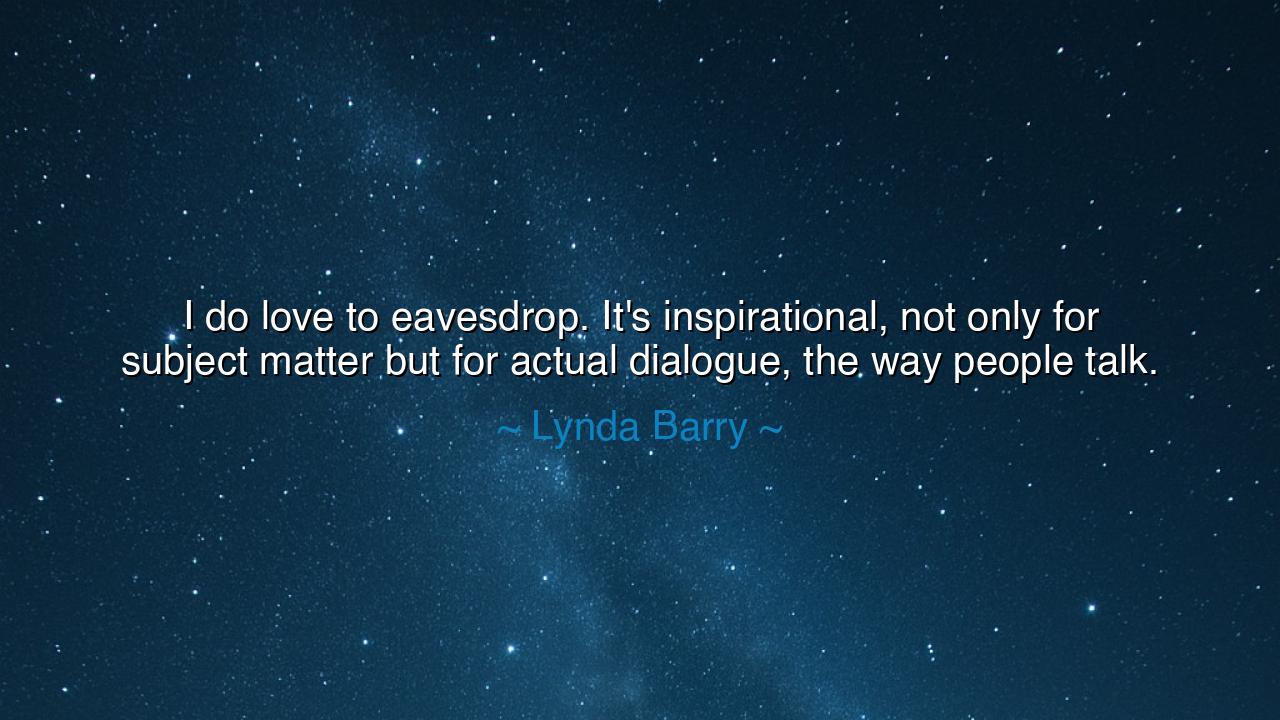
I do love to eavesdrop. It's inspirational, not only for subject
I do love to eavesdrop. It's inspirational, not only for subject matter but for actual dialogue, the way people talk.






In the quiet moments of life, when the noise of the world fades and the subtle whispers of human existence become clear, there is wisdom to be found in what is often overlooked. Lynda Barry, an artist and storyteller, reveals this truth when she confesses, "I do love to eavesdrop. It's inspirational, not only for subject matter but for actual dialogue, the way people talk." These words, spoken with both humor and insight, speak to a profound and ancient truth: the power of observation. Listening, truly listening, is an art—one that allows us to understand the rhythms of life, the nuances of language, and the hidden stories that are often missed in the rush of everyday existence.
Throughout the ages, the art of listening has been revered by the greatest philosophers, poets, and sages. In the ancient world, Socrates often listened deeply to the conversations around him, engaging not only with what was said, but with how it was said. He understood that dialogue is not just a means of exchanging information, but a window into the soul of a society. The way people speak—the language they use, the rhythms of their speech, the words they choose to reveal themselves—tells us more about the nature of their hearts than any formal declaration ever could. Barry, in her own way, captures this idea, understanding that in the seemingly mundane conversations of others, there is inspiration to be found, not just for subject matter, but in the very form of expression.
Consider the story of Homer, the blind poet who wove the epic tales of the Iliad and the Odyssey. Though he could not see the world as others did, he was keenly attuned to the sounds of life—the voices of the people, the hum of nature, the cadence of human emotion. His ability to capture the essence of life’s great struggles and triumphs came from his deep listening to the world around him. It was not merely the events themselves that inspired him, but the language of the people, the way they spoke their truths, sometimes with laughter, sometimes with tears, always with a raw honesty. Barry, too, draws from this well of inspiration, understanding that the dialogue of life is as important as the story itself.
In many ways, eavesdropping—as Barry describes it—becomes a form of creative absorption. It is an act of paying attention, of listening with an open heart to the world’s conversations, to the stories that play out in the background of our lives. In ancient times, the great storytellers and bards would travel from village to village, listening to the tales told in whispers in darkened corners or across crowded markets. They did not simply observe the content of the stories but the style and cadence with which they were told. It was in these hidden moments of life—in the cracks between the formal and the sacred—that the deepest inspiration often resided. Barry’s love for eavesdropping is a modern reflection of this ancient practice, a way of tuning into the unspoken currents of life that flow beneath the surface of what we see.
Listening to the dialogue of others is not just about collecting stories, but about understanding the human condition. The way people speak—what they choose to reveal or conceal, the words they use when they laugh or cry—gives us insight into their desires, fears, and aspirations. The art of eavesdropping, then, is not simply an act of curiosity; it is a path to understanding. It is through the words of others, through their language, that we come to see ourselves more clearly. By paying attention to the subtle ways people express themselves, we gain the power to reflect upon our own lives, to understand how we too speak and express our truths to the world.
Consider the story of William Shakespeare, who, through his plays, became the eternal mirror of humanity. He did not invent the stories he told; rather, he listened to the dialogue of his time, capturing the essence of human interaction, from the deepest sorrow to the greatest joy. Shakespeare understood the power of language, and in the same way, Barry understands that the beauty of conversation—whether profound or mundane—is a wellspring of inspiration. It is in the nuance of the words we speak, in the way we express our deepest emotions, that we find not just the subject matter of our stories, but the heartbeat of human life itself.
To future generations, take this wisdom to heart: in the rush of life, remember to pause, to listen, and to observe the dialogue of the world around you. Eavesdrop, not as an act of invasion, but as a means of absorbing the richness of the human experience. Find inspiration not only in the grand narratives, but in the quiet, unspoken moments of conversation. For it is in the way people talk, the rhythm of their words, the subtleties of their speech, that you will find the greatest treasures of wisdom and art. Let the world speak to you, and in doing so, you will learn more than you ever could through words alone.






AAdministratorAdministrator
Welcome, honored guests. Please leave a comment, we will respond soon